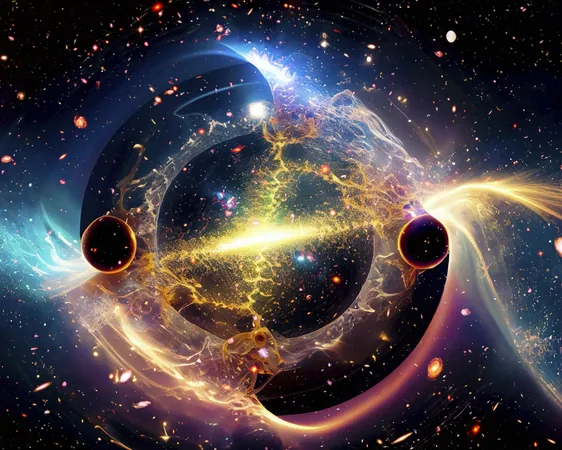
Revolutionary Theory Connects Einstein's Relativity and Quantum Mechanics!
2025-06-24
Author: Ying
For over a century, two monumental theories have dominated our understanding of the cosmos: quantum mechanics and Einstein's general relativity. The former delves into the mysterious world of particles while the latter reveals the grandeur of gravity and spacetime. Yet, despite their successes, merging these two theories has remained one of science's most elusive challenges.
Now, researchers from University College London are turning heads with a daring proposition. Instead of adjusting Einstein's framework to fit the quantum realm, they suggest a complete paradigm shift. Their groundbreaking model, known as a 'postquantum theory of classical gravity,' seeks to redefine the relationship between gravity and quantum phenomena.
Quantum mechanics thrives on the unpredictable nature of subatomic particles, fueling advancements in technology and revealing the intricate atom structure. In contrast, general relativity portrays a majestic universe where massive objects warp spacetime, generating what we perceive as gravity. However, attempts to reconcile these conflicting perspectives often lead to mathematical chaos and incoherence, leaving scientists puzzled.
A Bold New Perspective on Gravity and Quantum Mechanics
What distinguishes the UCL team's approach is their unwillingness to force gravity into the quantum framework. Instead, they explore innovative interactions between classical gravity and quantum states, potentially unlocking theories that have yet to be fully examined. As they propose, 'What if the quandary isn't with gravity but with our understanding of the quantum domain?'
If validated, this theory could revolutionize our view of the universe, crafting a new narrative where gravity and quantum mechanics coexist without conflict.
Spacetime: Classical, Yet Complex
Leading the charge is Professor Jonathan Oppenheim and his UCL team, who have introduced a radically new idea: spacetime could remain classical, unaffected by the quirks of quantum physics. Their theory, detailed in a paper in Physical Review X, suggests not altering spacetime itself but refining quantum theory to align with a classical perspective on spacetime.
At its core, this new concept posits that spacetime undergoes random and intense fluctuations beyond typical quantum expectations. If these fluctuations can be precisely measured, they could render the weight of objects unpredictably variable, a phenomenon previously thought impossible.
Ready for Testing: The Future of Gravity and Quantum Theory
To put this theory to the test, the researchers are proposing an experimental setup to gauge fluctuations in mass over time. They plan to measure the standard 1 kg mass used globally. If this measurement unveils inconsistencies, it would fundamentally challenge the postquantum theory.
This endeavor is more than just theoretical; it's a pivotal experiment that could reshape our comprehension of the interactions between gravity and quantum mechanics.
Five Years in the Making: Meticulous Research
Professor Oppenheim and his team have dedicated five years to meticulously refining their theories, addressing various angles of this storehouse of knowledge. 'Quantum theory and general relativity are fundamentally at odds, and understanding this contradiction is crucial,’ states Oppenheim.
Beyond Gravity: Unpacking the Postquantum Theory's Consequences
While centered on resolving quantum mechanics and general relativity, the implications of this postquantum theory extend further. One significant outcome is reevaluating the 'measurement postulate' of quantum theory, which has historically baffled scientists.
Oppenheim's path to the postquantum theory was spurred by grappling with the black hole information paradox. Under conventional quantum theory, information cannot vanish, creating a contradiction with general relativity. The new theory proposes that the irreducible unpredictability linked to spacetime permits information destruction, thus overcoming this prolonged dilemma.
Gravitationally Mediated Entanglement: New Experimental Horizons
Another experimental venture aims to probe the quantum nature of spacetime through 'gravitationally mediated entanglement.' Though daunting, these investigations promise substantial insights into the laws governing nature.
Professor Sougato Bose, an expert familiar with this domain, acknowledged the importance of researching spacetime's nature: 'While these experiments will require significant efforts, they're crucial for unlocking the fundamental laws of nature. We may have answers in the next two decades.'
As Oppenheim concludes, "With a coherent theory where spacetime remains classical, the future of physics is boundless, and the questions are only just beginning." The realm of physics has never been more exhilarating.
The Quest for Understanding: A Cosmic Challenge
Ultimately, quantum mechanics governs everything from technology to the behavior of particles, while relativity challenges our understanding of gravity's fundamental nature. The quest to combine these realms promises not just scientific insights but a profound transformation of our reality.



 Brasil (PT)
Brasil (PT)
 Canada (EN)
Canada (EN)
 Chile (ES)
Chile (ES)
 Česko (CS)
Česko (CS)
 대한민국 (KO)
대한민국 (KO)
 España (ES)
España (ES)
 France (FR)
France (FR)
 Hong Kong (EN)
Hong Kong (EN)
 Italia (IT)
Italia (IT)
 日本 (JA)
日本 (JA)
 Magyarország (HU)
Magyarország (HU)
 Norge (NO)
Norge (NO)
 Polska (PL)
Polska (PL)
 Schweiz (DE)
Schweiz (DE)
 Singapore (EN)
Singapore (EN)
 Sverige (SV)
Sverige (SV)
 Suomi (FI)
Suomi (FI)
 Türkiye (TR)
Türkiye (TR)
 الإمارات العربية المتحدة (AR)
الإمارات العربية المتحدة (AR)